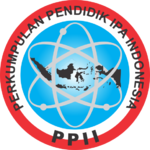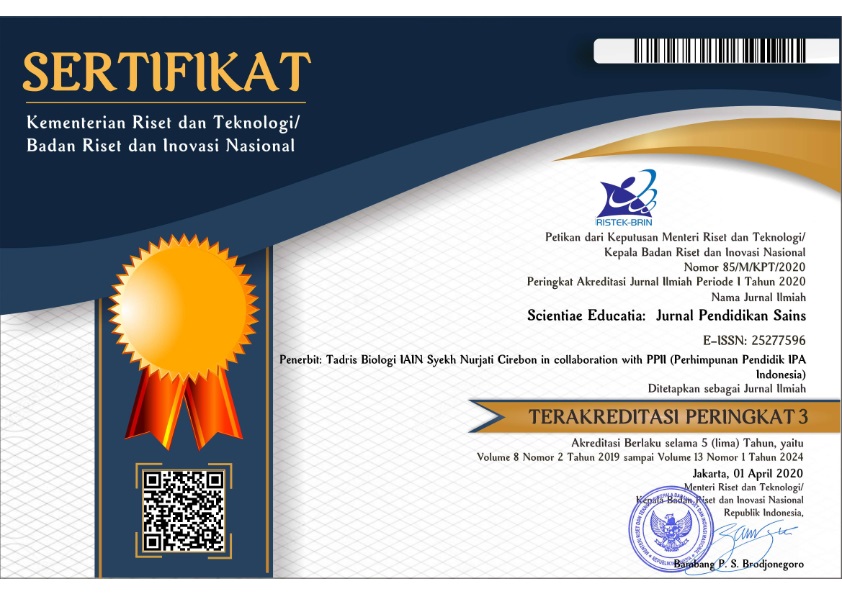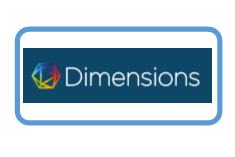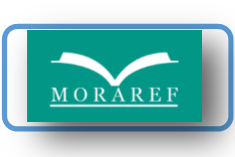Profile of Pesantren Students’ Character, Scientific Reasoning Skills and Its’ Relationship
(1) Department of science education, faculty of education, University of Trunojoyo Madura
(2) Department of science education, faculty of education, University of Trunojoyo Madura
(3) Department of science education, faculty of education, University of Trunojoyo Madura
(4) Department of science education, faculty of education, University of Trunojoyo Madura
(*) Corresponding Author
Abstract
Pesantren is an institution that focuses on students’ character building. Students have to stay 24 hours in Pesantren to participate in character building conducted by Pesantren. Many people trust to educate their children in Pesantren. Due to people’s trust in Pesantren and 21st century skills that should be conquered, the research was conducted to identify students’ character, scientific reasoning skills, and its’relationship. Result of the research could be the base to develop learning system, instruction, and media. The research was conducted in a survey method, using the LCTSR version of 2000 and character self- assessment. It was conducted in one of Pesantren in Pamekasan. 56 students was participated as the sample of the research. Learning instruction and character building in Pesantren were also described. The result shows that students in Pesantren have hard work character as the highest character scorescore and honesty as the lowest character scorescore. It indicates that Pesantren needs to reform character building program, especially to build honesty. Students’ scientific reasoning skills are low. More than 98% are at a concrete level of cognitive development and there is no correlation between students’ character and scientific reasoning skills. Due to the result, there should be a transformation in the learning system in Pesantren, to improve students’ scientific reasoning skills.
Keywords
Full Text:
PDFReferences
Afifi, M., & Rahim, N. A. A. (2021). Mathematics learning module based on character learning: a proposal of the study. Development, 10(1), 139-153.
Baharun, H. (2017). Total moral quality: a new approach for character education in pesantren. Ulumuna, 21(1), 57-80.
Bao, L., Fang, K., Cai, T., Wang, J., Yang, L., Cui, L., ... & Luo, Y. (2009). Learning of content knowledge and development of scientific reasoning ability: A cross culture comparison. American journal of physics, 77(12), 1118-1123.
Burić, I., & Kim, L. E. (2020). Teacher self-efficacy, instructional quality, and student motivational beliefs: An analysis using multilevel structural equation modeling. Learning and Instruction, 66, 101302.
Danoebroto, S. W. (2015). Teori belajar konstruktivis Piaget dan Vygotsky. Indonesian Digital Journal of Mathematics and Education, 2(3), 191-198.
Ding, L. (2013). Detecting progression of scientific reasoning among university science and engineering students. In Physics Education Research Conference (pp. 125-128).
Ding, L., Wei, X., & Liu, X. (2016). Variations in university students’ scientific reasoning skills across majors, years, and types of institutions. Research in Science Education, 46(5), 613-632.
Docktor, J. L., Strand, N. E., Mestre, J. P., & Ross, B. H. (2015). Conceptual problem solving in high school physics. Physical Review Special Topics-Physics Education Research, 11(2), 020106.
Han, J. (2013). Scientific reasoning: Research, development, and assessment. The Ohio State University.
Hope, J., & Allen, B. (2012, March). Student competitive events: A strategy for integrating a STEM block in public schools. In Society for Information Technology & Teacher Education International Conference (pp. 3852-3856). Association for the Advancement of Computing in Education (AACE).
https://ditpdpontren.kemenag.go.id/pdpp/statistik?id=35 accessed on 15th December 2021
Ibda, F. (2015). Perkembangan kognitif: teori jean piaget. Intelektualita, 3(1), 27-38.
Inthaud, K., Bongkotphet, T., & Chindaruksa, S. (2019, February). Argument-driven inquiry instruction to facilitate scientific reasoning of 11th grade students in light and visual instrument topic. In Journal of Physics: Conference Series (Vol. 1157, No. 3, p. 032014). IOP Publishing.
Junaidi, K. (2016). Sistem Pendidikan Pondok Pesantren di Indonesia (Suatu Kajian Sistem Kurikulum di Pondok Pesantren Lirboyo). Istawa: Jurnal Pendidikan Islam, 2(1), 95- 100.
Kambeyo, L., & Csapó, B. (2018). Scientific Reasoning skills: A theoretical Backgrounds to science education. In Reform Forum: Journal for Educational Research in Namibia (Vol. 26, No. 1, pp. 27-36).
Kesuma, G. C. (2017). Refleksi model pendidikan pesantren dan tantangannya masa kini. Tadris: Jurnal Keguruan dan Ilmu Tarbiyah, 2(1), 67-79.
Kosterelioglu, I. (2018). Effects of parenting style on students' achievement goal orientation: a study on high school students. Educational Policy Analysis and Strategic Research, 13(4), 91-107.
Ma’arif, Syamsul (2018). Education as a Foundation of Humanity: Learning from the Pedagogy of Pesantren in Indonesia. Journal of Social Studies Education Research, 9(2), 104-123.
Mashudi, M. (2020). Pesantren-based higher education institutions: the format of modern Islamic education. Ta'dib: Jurnal Pendidikan Islam, 25(2), 119-135.
Moore, J. C., & Rubbo, L. J. (2012). Scientific reasoning abilities of nonscience majors in physics-based courses. Physical Review Special Topics-Physics Education Research, 8(1), 010106.
Mulyanto, M., Masykuri, M., & Sarwanto, S. Pengembangan modul IPA terpadu SMP/MTs kelas VII dengan model discovery learning tema air limbah industri batik untuk meningkatkan keterampilan proses sains. INKUIRI: Jurnal Pendidikan IPA, 6(2), 57-66.
Mu'min, S. A. (2013). Teori Perkembangan Kognitif Jean Piaget. Al-TA'DIB: Jurnal Kajian Ilmu Kependidikan, 6(1), 89-99.
National Research Council. (2012). A framework for K-12 science education: Practices, crosscutting concepts, and core ideas. National Academies Press.
Nieminen, P., Savinainen, A., & Viiri, J. (2012). Relations between representational consistency, conceptual understanding of the force concept, and scientific reasoning. Physical Review Special Topics-Physics Education Research, 8(1), 010123.
Pasaribu, R. M. (2013). Influence of Parenting Style and Methods of Socialization on Honesty and Responsibility Character of High School Students in Bogor. Institut Pertanian Bogor
Perera, H. N., & John, J. E. (2020). Teachers’ self-efficacy beliefs for teaching math: Relations with teacher and student outcomes. Contemporary Educational Psychology, 61, 101842.
Prasitpong, S., & Rakkapao, S. (2019, August). Investigation of Thai university students’ scientific reasoning abilities. In Journal of Physics: Conference Series (Vol. 1287, No. 1, p. 012020). IOP Publishing.
PS, A. M. B. K. (2019). Problematika pesantren sebagai lembaga pendidikan Islam di Indonesia. Tawazun: Jurnal Pendidikan Islam, 12(2), 225-233.
Rachmawati, Y. (2012). Pendidikan karakter melalui pengembangan model pembelajaran RKCK (Rasa Karsa Cipta Karya). Jurnal Pendidikan Anak, 1(1). 21-30
Saavedra, A. R., & Opfer, V. D. (2012). Learning 21st-century skills requires 21st-century teaching. Phi Delta Kappan, 94(2), 8-13.
Sahin, M. C. (2009). Instructional design principles for 21st century learning skills. Procedia-Social and Behavioral Sciences, 1(1), 1464-1468.
Sitorus, D. S., Siswandari, S., & Kristiani, K. (2019). The effectiveness of accounting e-module integrated with character value to improve students’ learning outcomes and honesty. Jurnal Cakrawala Pendidikan, 38(1), 120-129.
Stammen, A. N., Malone, K. L., & Irving, K. E. (2018). Effects of modeling instruction professional development on biology teachers’ scientific reasoning skills. Education Sciences, 8(3), 119-138.
Sugiarti, M., & Husain, H. (2019, April). The correlation between academic honesty and a students’ curiosity with the results of learning based on discovery learning. In 1st International Conference on Advanced Multidisciplinary Research (ICAMR 2018) (pp. 336-340). Atlantis Press.
Sugiarti & Husain, H. (2021). An influence of the contextual-based discovery learning model on the academic honesty of high school students. International Journal of Instruction, 14(3), 645-660.
Sumardi, K. (2012). Potret pendidikan karakter di pondok pesantren salafiah. Jurnal Pendidikan Karakter, 3(3). 280-292.
Tajudin, Nor’ain Mohd. & Chinappan, Mohan. (2017). Relationship between scientific reasoning skills and mathematics achievement among Malaysian students. Geografia- Malaysian Journal of Society and Space, 12(1).
Talib, C. A., Rajan, S. T., Abd Hakim, N. W., Malik, A. M. A., Siang, K. H., & Ali, M. (2018, November). Gender difference as a factor in fostering scientific reasoning skill among students. In 2018 IEEE 10th International Conference on Engineering Education (ICEED) (pp. 54-58). IEEE.
Utama, Z. P., Maison, M., & Syarkowi, A. (2018). Analisis kemampuan bernalar siswa SMA Kota Jambi. Jurnal Penelitian Pembelajaran Fisika, 9(1), 1-5.
Wahyono, W. (2020). Peningkatan Kejujuran dan Hasil Belajar Fisika Kompetensi Getaran Gelombang dan Bunyi dengan Metode Discovery Learning. Jurnal Kinerja Kependidikan (JKK), 2(4), 590-600.
Winata, K. A., Suhartini, A., & Ahmad, N. (2021). Development of curriculum and learning system in pondok pesantren.(a case study at pesantren Al Falah Dago Bandung). Randwick International of Education and Linguistics Science Journal, 2(1), 29-36.
Wulandari, F. E., & Shofiyah, N. (2018, April). Problem-based learning: effects on student’s scientific reasoning skills in science. In Journal of Physics: Conference Series (Vol. 1006, No. 1, p. 012029). IOP Publishing.
Yediarani, R. D., Maison, M., & Syarkowi, A. (2019). Scientific reasoning abilities profil of junior high school students in Jambi. Indonesian Journal of Science and Education, 3(1), 21-25.
Zafi, A. A. (2021). Character building in pondok pesantren Al-Ghurobaa'. Al-Insyiroh: Jurnal Studi Keislaman, 7(2), 17-35.
Zurqoni, Retnawati, H., Arlinwibowo, J., & Apino, E. (2018). Strategy and implementation of character education in senior high schools and vocational high schools. Journal of Social Studies Education Research, 9(3), 370-397.
DOI: 10.24235/sc.educatia.v11i1.9570
Article Metrics
Abstract view : 10 timesPDF - 5 times
Refbacks
- There are currently no refbacks.
Scientiae Educatia: Jurnal Pendidikan Sains indexed by:

This work is licensed under a Creative Commons Attribution 4.0 International License.
Stat Counter (Link)



1.png)












